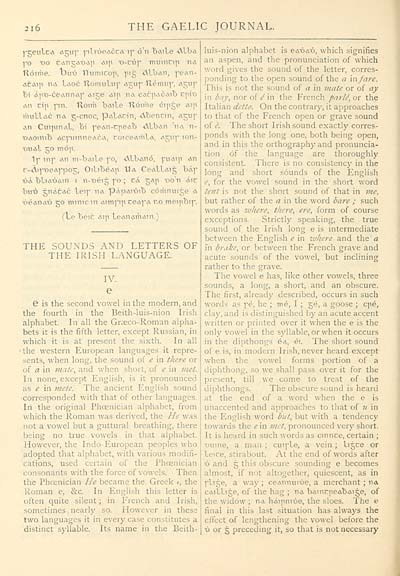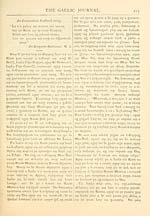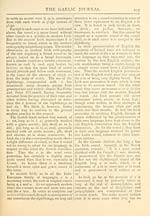Blair Collection > Gaelic journal > Volume 1, number 1
(230)
Download files
Complete book:
Individual page:
Thumbnail gallery: Grid view | List view

2l6
THE GAELIC JOURNAL.
■[■jeulcA Ajii)" I'llniieACCA i]' ó'n b^ile Albŵ
l'O "00 CAll^A-OA]! <\1)\ •0-CÚ]' IIUIHICIH llA
Uóiiiie. bu-ù lltimico]!, ]\ì^ -cMbẃii, ye^n-
ACAiji nA Iaoc llonnilu)- Agiif lleimii', ajuj-
bi Á]\-o-ceAnnA)' Aije aih iia cArjiACAib cin'-o
All ci]i ]'in. Ixoiiii bAile Uoitiie eijije ai^i
iìuiUac ha 5-cnoc, pAÌArín, -Abencin, Agu]-
All CmiimAl, bi I'eAn-qieAb <\lbAn 'iia n-
DAOiiiib AcpinniieACA, roiceAiiibA, a;:^!!]" ion-
tdiiaI 50 inoji,
)y 111]- All 111-bAile ]-o, <\bbAnó, ituaiji ah
r-^i]-T)eAi-po5, OilibéAji Ha CeAblAij bÁ]'
■óÁ bLiŵ-ÓAiii 1 ivoéij i'o ; üÁ ja^a •oo'n Áiü
buo jnÁCÄC leif iia pÁjjAibib cóiiininje a
xSéAiiA-ó 50 iiiinicm aiiii-|-i]1 ceA]'A r.o iiiei]\bi-[\
(Le heit Ai)i leAiiAtiiAiii.)
THE SOUNDS AND LETTERS OF
THE H^ISH LANGUAGE.
IV.
e
& is the second vowel in the modern, and
the fourth in the Beith-luis-nion Irish
alphabet. In all the Grseco-Roman alpha-
bets it is the fifth letter, except Russian, in
which it is at present the sixth. In all
the western European languages it repre-
sents, when long, the sound of e in t/iere or
of a in maU', and when short, of e in mei.
In none, except English, is it pronounced
as e in meU. The ancient English sound
corresponded with that of other languages.
In the original Phoenician alphabet, from
which the Roman was derived, the //i was
not a vowel but a guttural breathing, there
being no true vowels in that alphabet.
However, the Indo-European peoples who
adopted that alphabet, with various modifi-
cations, used certain of the Phoenician
consonants with the force of vowels. Then
the Phoenician J-fe became the Greek f, the
Roman e, &c. In English this letter is
often quite silent ; in French and Irish,
sometimes nearly so. However in these
two languages it in every case constitutes a
distinct syllable. Its name in the Beith-
luis-nion alphabet is eA-ÓA-ò, which signifies
an aspen, and the pronunciation of which
word gives the sound of the letter, corres-
ponding to the open sound of the a in/are.
This is not the sound of a in inate or of ay
in ùaj, nor of / in the French parlé, or the
Italian detto. On the contrary, it approaches
to that of the French open or grave sound
of <?. The short Irish sound exactly corres-
ponds with the long one, both being open,
and in this the orthography and pronuncia-
tion of the language are thoroughly
consistent. There is no consistency in the
long and short sounds of the English
e, for the vowel sound in the short word
tent is not the short sound of that in vie,
but rather of the a in the word bare ; such
words as 'where, there, ere, form of course
exceptions. Strictly speaking, the true
sound of the Irish long e is intermediate
between the English e in where and the a
m brake, or between the French grave and
acute sounds of the vowel, but inclining
rather to the grave.
The vowel e has, like other vowels, three
sounds, a long, a short, and an obscure.
The first, already described, occurs in such
words as pé, he ; nié, I ; gé, a goose ; cjie,
clay, and is distinguished by an acute accent
written or printed over it when the e is the
only vowel
in the di
of eis, in modern Irish, never heard except
when the vowel forms portion of a
diphthong, so we shall pass over it for the
present, till we come to treat of the
diphthongs. The obscure sound is heard
at the end of a word when the e is
unaccented and approaches to that of ti in
the English word but, but with a tendency
towards the e in met, pronounced very short.
It is heard in such words as cinnce, certain ;
nume, a man ; cuiple, a vein ; tijce or
leice, stirabout. At the end of words after
•Ó and 5 this obscure sounding e becomes
almost, if not altogether, quiescent, as in
flije, a way ; ceAnnuibe, a merchant ; iia
CAiblije, of the hag ; riA bAinciicAbAije, of
the widow ; riA hAijinitie, the sloes. The e
final in this last situation has always the
effect of lengthening the vowel before the
■Ó or 5 preceding it, so that is not necessary
or printed over it when the e is the
wel in the syllable, or when it occurs J
dipthongs éA, éi. The short sound I
in modern Irish, never heard except I
THE GAELIC JOURNAL.
■[■jeulcA Ajii)" I'llniieACCA i]' ó'n b^ile Albŵ
l'O "00 CAll^A-OA]! <\1)\ •0-CÚ]' IIUIHICIH llA
Uóiiiie. bu-ù lltimico]!, ]\ì^ -cMbẃii, ye^n-
ACAiji nA Iaoc llonnilu)- Agiif lleimii', ajuj-
bi Á]\-o-ceAnnA)' Aije aih iia cArjiACAib cin'-o
All ci]i ]'in. Ixoiiii bAile Uoitiie eijije ai^i
iìuiUac ha 5-cnoc, pAÌArín, -Abencin, Agu]-
All CmiimAl, bi I'eAn-qieAb <\lbAn 'iia n-
DAOiiiib AcpinniieACA, roiceAiiibA, a;:^!!]" ion-
tdiiaI 50 inoji,
)y 111]- All 111-bAile ]-o, <\bbAnó, ituaiji ah
r-^i]-T)eAi-po5, OilibéAji Ha CeAblAij bÁ]'
■óÁ bLiŵ-ÓAiii 1 ivoéij i'o ; üÁ ja^a •oo'n Áiü
buo jnÁCÄC leif iia pÁjjAibib cóiiininje a
xSéAiiA-ó 50 iiiinicm aiiii-|-i]1 ceA]'A r.o iiiei]\bi-[\
(Le heit Ai)i leAiiAtiiAiii.)
THE SOUNDS AND LETTERS OF
THE H^ISH LANGUAGE.
IV.
e
& is the second vowel in the modern, and
the fourth in the Beith-luis-nion Irish
alphabet. In all the Grseco-Roman alpha-
bets it is the fifth letter, except Russian, in
which it is at present the sixth. In all
the western European languages it repre-
sents, when long, the sound of e in t/iere or
of a in maU', and when short, of e in mei.
In none, except English, is it pronounced
as e in meU. The ancient English sound
corresponded with that of other languages.
In the original Phoenician alphabet, from
which the Roman was derived, the //i was
not a vowel but a guttural breathing, there
being no true vowels in that alphabet.
However, the Indo-European peoples who
adopted that alphabet, with various modifi-
cations, used certain of the Phoenician
consonants with the force of vowels. Then
the Phoenician J-fe became the Greek f, the
Roman e, &c. In English this letter is
often quite silent ; in French and Irish,
sometimes nearly so. However in these
two languages it in every case constitutes a
distinct syllable. Its name in the Beith-
luis-nion alphabet is eA-ÓA-ò, which signifies
an aspen, and the pronunciation of which
word gives the sound of the letter, corres-
ponding to the open sound of the a in/are.
This is not the sound of a in inate or of ay
in ùaj, nor of / in the French parlé, or the
Italian detto. On the contrary, it approaches
to that of the French open or grave sound
of <?. The short Irish sound exactly corres-
ponds with the long one, both being open,
and in this the orthography and pronuncia-
tion of the language are thoroughly
consistent. There is no consistency in the
long and short sounds of the English
e, for the vowel sound in the short word
tent is not the short sound of that in vie,
but rather of the a in the word bare ; such
words as 'where, there, ere, form of course
exceptions. Strictly speaking, the true
sound of the Irish long e is intermediate
between the English e in where and the a
m brake, or between the French grave and
acute sounds of the vowel, but inclining
rather to the grave.
The vowel e has, like other vowels, three
sounds, a long, a short, and an obscure.
The first, already described, occurs in such
words as pé, he ; nié, I ; gé, a goose ; cjie,
clay, and is distinguished by an acute accent
written or printed over it when the e is the
only vowel
in the di
of eis, in modern Irish, never heard except
when the vowel forms portion of a
diphthong, so we shall pass over it for the
present, till we come to treat of the
diphthongs. The obscure sound is heard
at the end of a word when the e is
unaccented and approaches to that of ti in
the English word but, but with a tendency
towards the e in met, pronounced very short.
It is heard in such words as cinnce, certain ;
nume, a man ; cuiple, a vein ; tijce or
leice, stirabout. At the end of words after
•Ó and 5 this obscure sounding e becomes
almost, if not altogether, quiescent, as in
flije, a way ; ceAnnuibe, a merchant ; iia
CAiblije, of the hag ; riA bAinciicAbAije, of
the widow ; riA hAijinitie, the sloes. The e
final in this last situation has always the
effect of lengthening the vowel before the
■Ó or 5 preceding it, so that is not necessary
or printed over it when the e is the
wel in the syllable, or when it occurs J
dipthongs éA, éi. The short sound I
in modern Irish, never heard except I
Set display mode to: Large image | Transcription
Images and transcriptions on this page, including medium image downloads, may be used under the Creative Commons Attribution 4.0 International Licence unless otherwise stated. ![]()
| Early Gaelic Book Collections > Blair Collection > Gaelic journal > Volume 1, number 1 > (230) |
|---|
| Permanent URL | https://digital.nls.uk/79315676 |
|---|
| Description | No. 1, Vol. I. November, 1882. |
|---|---|
| Shelfmark | Blair.214 |
| Additional NLS resources: | |
| Attribution and copyright: |
|
| Description | A selection of books from a collection of more than 500 titles, mostly on religious and literary topics. Also includes some material dealing with other Celtic languages and societies. Collection created towards the end of the 19th century by Lady Evelyn Stewart Murray. |
|---|
| Description | Selected items from five 'Special and Named Printed Collections'. Includes books in Gaelic and other Celtic languages, works about the Gaels, their languages, literature, culture and history. |
|---|

